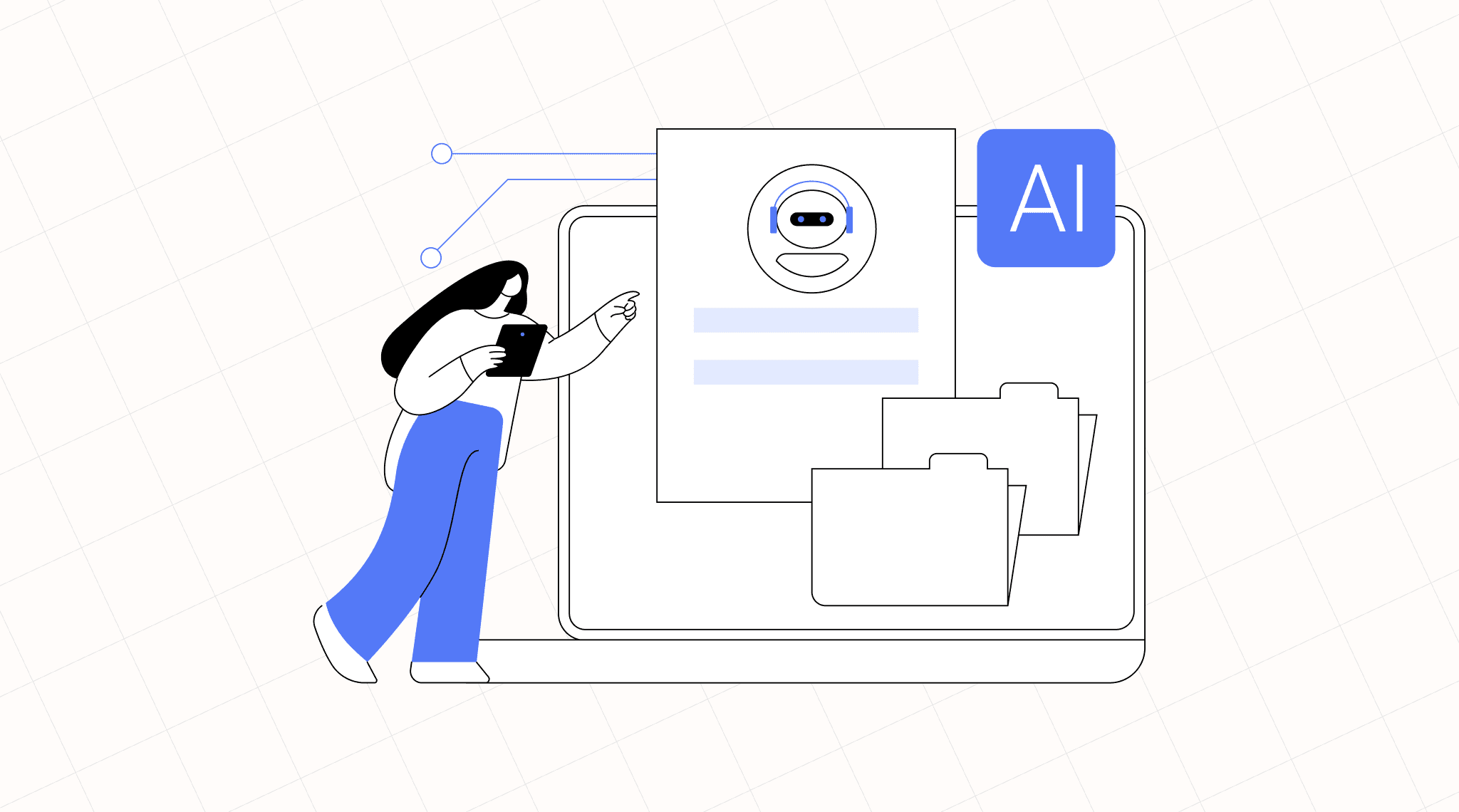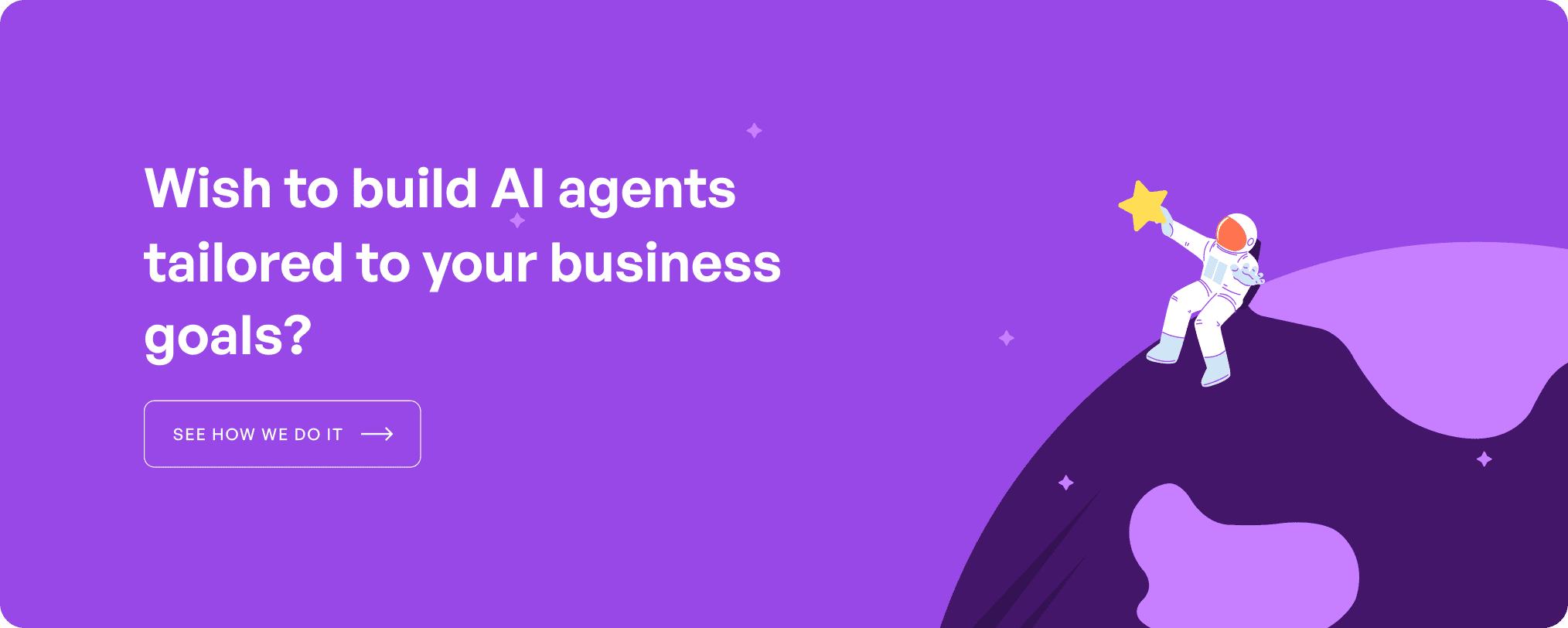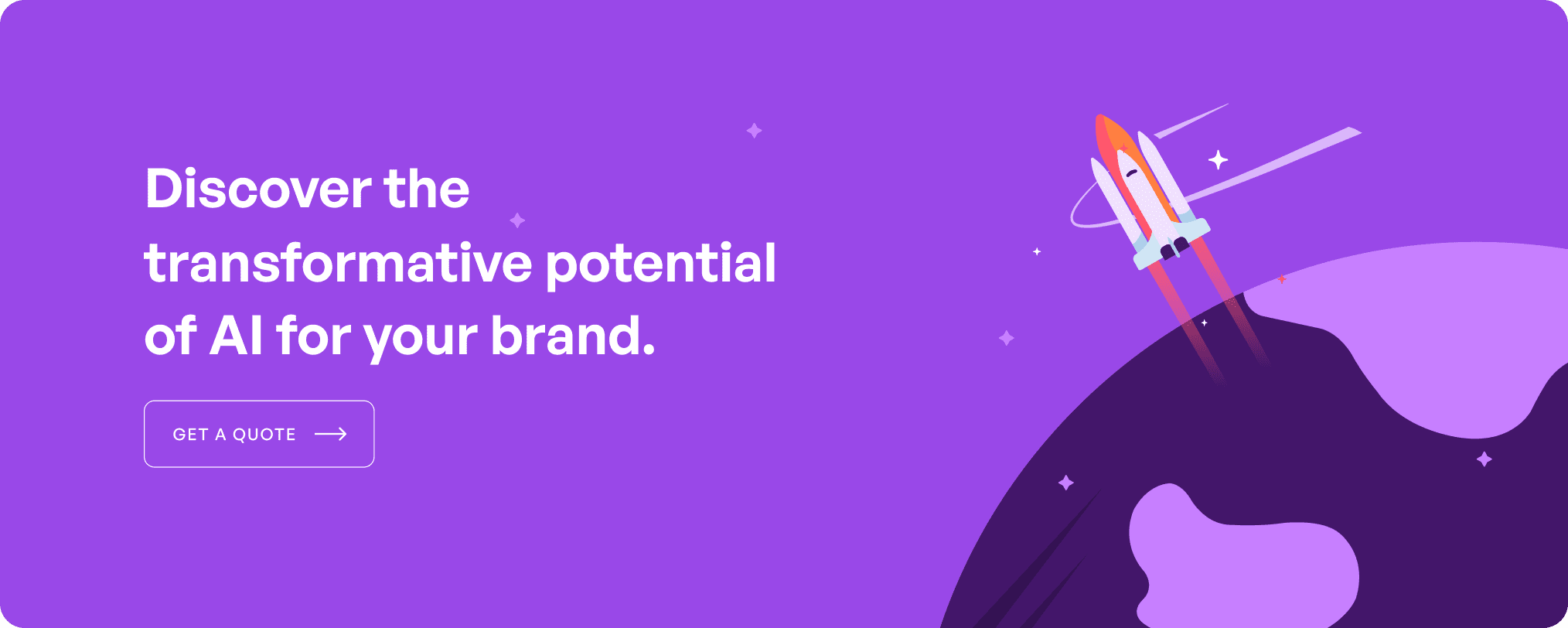Imagine a world where digital assistants don’t just answer questions, but truly act on your behalf – enter AI agents. These clever systems can learn and take actions autonomously, helping you analyze data, or even manage entire projects without needing constant supervision. Like personal digital companions, AI agents use algorithms and machine learning to adapt to your needs, anticipate problems, and provide smart solutions. From virtual assistants to robotic helpers, these agents are reshaping how we interact with technology and uplifting business operations as a whole.
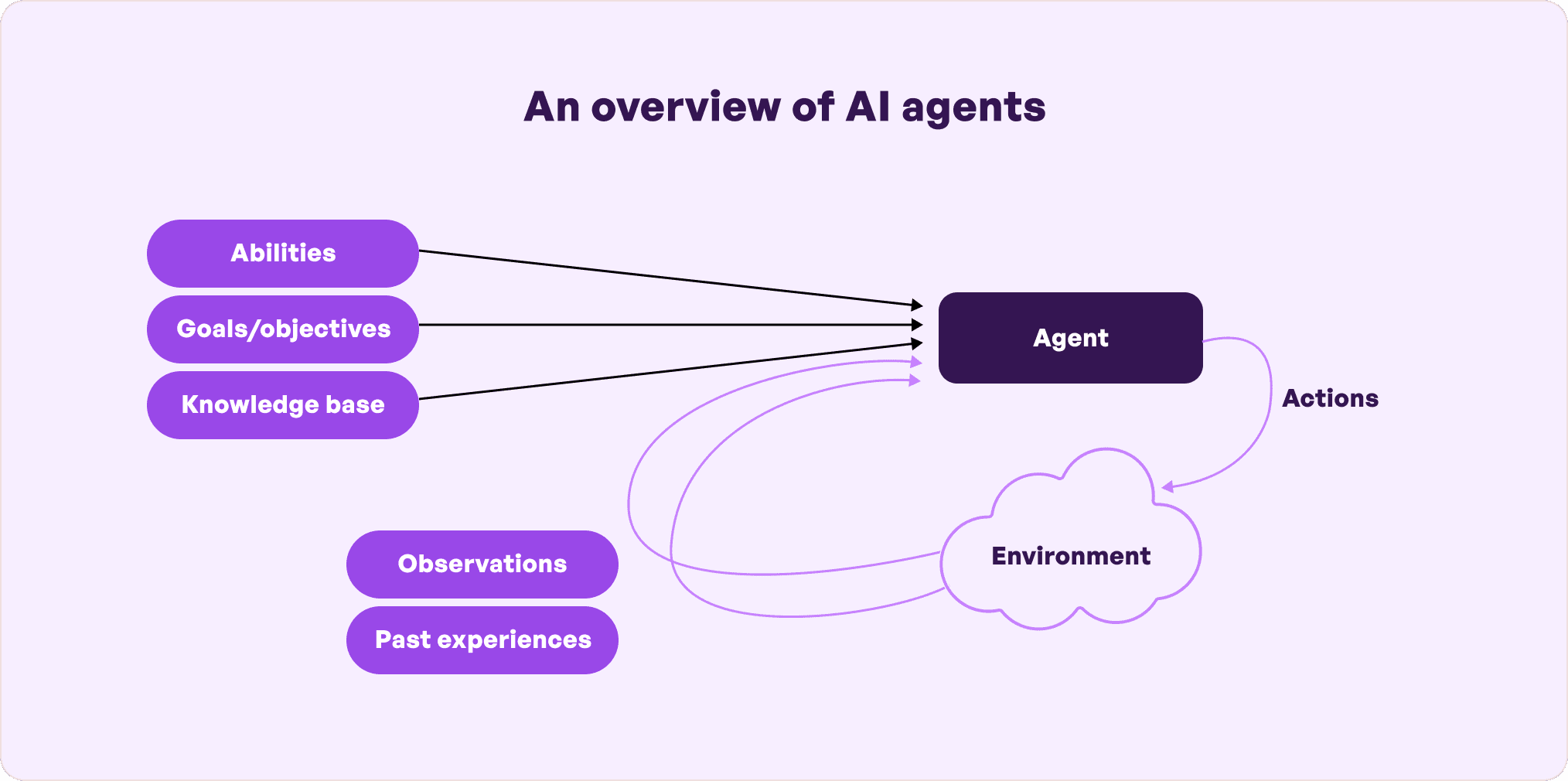 Due to these incredible capabilities, the AI agent market size is predicted to achieve $210,664 million by 2033 growing at 32.6% CAGR from 2023. Core factors that are at the forefront of driving this growth include AI technologies and cloud-based services along with the demand for business agility and automation. These are in different sectors like finance, healthcare, education, and robotics, and manufacturing to name a few.
Due to these incredible capabilities, the AI agent market size is predicted to achieve $210,664 million by 2033 growing at 32.6% CAGR from 2023. Core factors that are at the forefront of driving this growth include AI technologies and cloud-based services along with the demand for business agility and automation. These are in different sectors like finance, healthcare, education, and robotics, and manufacturing to name a few.
This article tells you what AI agents are and how they function in close collaboration to humans. Read on to find the details.
Table of contents
What is an AI agent?
AI agents are software programs capable of performing tasks autonomously to improve and transform physical and digital business environments. At the core of AI agents lie fields of study like neural networks, machine learning, and natural language processing. They assist in identifying patterns, recognizing human prompts, and making data-driven predictions – all from information stored in the past. Intelligence and interactivity are achieved from both knowledge and limitation-based data that are used to train them.
AI agents are growing at a rapid pace due to a unique difference that sets them apart from ChatGPT or Claude. This is its ability to perceive its environment, learn from data, and then make decisions without further human intervention.
These decisions are rational and completely focused on the perception of their surroundings and software interfaces to ensure optimal performance. It is unlike other systems where humans need to prompt and continue prompting till they receive the desired results.
Starting with the top benefits of AI agents in businesses.
1. Data analysis
AI agents can analyze vast amounts of complex real-time data with the help of ML to discover trends and offer comprehensive responses. This helps businesses plan their next moves and strategies while helping in making growth-oriented decisions. For example, analyzing product demand in the market and forecasting sales.
2. Task automation
Repetitive and time-intensive tasks can be seamlessly managed by AI agents who are designed to reduce the workload of human agents. For instance, while employees invest their attention in creative or critical activities that require human fine motor skills and reasoning that deliver business value, agents can solve customer inquiries without any human intervention.
3. Cost reduction
Owing to the above two benefits, AI agents help lower labor costs which ultimately eliminates process inefficiencies and associated expenses. This becomes possible since the system performs the same tasks consistently without the risks of disruptions or distractions which are otherwise common in humans.
4. Competitive advantage
Understanding AI agents and leveraging them in your business can keep you ahead of competitors in terms of efficiency, innovation, customer experiences, and ultimately better reputation and revenue generation. In fact, 89% of B2B and B2C directors believe that the ethical use of AI can offer competitive superiority.
5. Scalability
With different types of artificial intelligence agents, businesses can easily scale their operations without employing human resources. For example, AI agents can provide insights into customer behavior which helps in better marketing, fixing issues, and adopting futuristic solutions – the essential parameters for both budding small businesses and established enterprises to expand their horizons.
6. Customer service
A survey of 2,000 consumers across the USA and UK was conducted where 86% confirmed that they would ditch a brand due to poor customer service. Using AI chat agents can be an excellent way to avoid this disconnect. They can promptly analyze speech and sentiments and then mix them with previous service history to deliver coveted results. This is a fantastic way to ensure both customer satisfaction and thus repeat business.
7. Personalization
Certain industries like insurance, healthcare, and finance often require 100% personalized services to cater to unique consumer demands. This translates into increased engagement and sales, competitive difference, and client loyalty which ultimately reflects positively on revenue and profitability. Businesses can also increase the chances of trust building and staying relevant in their respective markets.
8. Garnering leads
One of the top characteristics of AI agents is that they can successfully connect with prospects and engage with them around the clock. What they do is identify, nurture potential customers and conduct precise targeting as well. All of this is helpful in increasing the possibilities of lead generation. They can also determine the likelihood of a lead being converted into sales which helps businesses personalize their offerings.
Wondering how to maximize AI agents? We at Simublade, are a leading AI development company where professionals can engineer intelligent agents aimed to automate your business and help you win the tech race. We assist every step of the way to achieve business goals 5X faster by ensuring continued productivity and profitability.
Core components of AI agents
There are multiple elements that make up the body and functionalities of the AI software and help it perform tasks to achieve the desired results. Read on to find out.
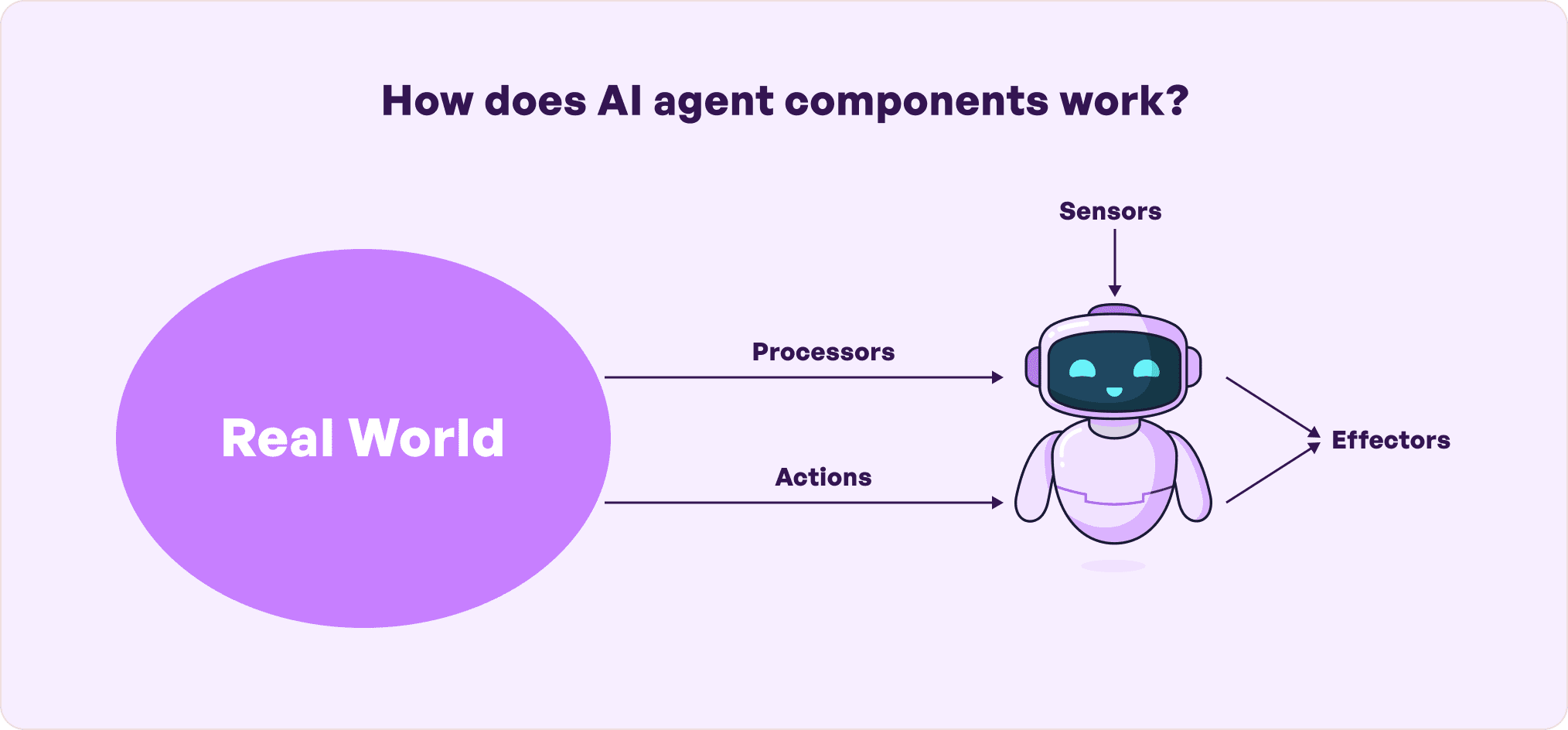
- Sensors: Microphones, cameras, and antennas gather inputs in the form of sounds, images, and radio frequencies, respectively.
- Effectors: Wheels, robotic legs and arms, and display screens to help them act real-time, in the real world for real people.
- Processors: This system is the ‘brain’ of the AI agent which helps process the data collected by sensors and design the course of action, accordingly.
- Knowledge base: This is a storage box for past behaviors, patterns, and preferences which are helpful to curate and deliver future results.
What are the types of AI agents?
There are several types of artificial intelligence agents with varying capabilities that businesses have embraced based on their goals. Here’s a list of real-life examples of AI agents.
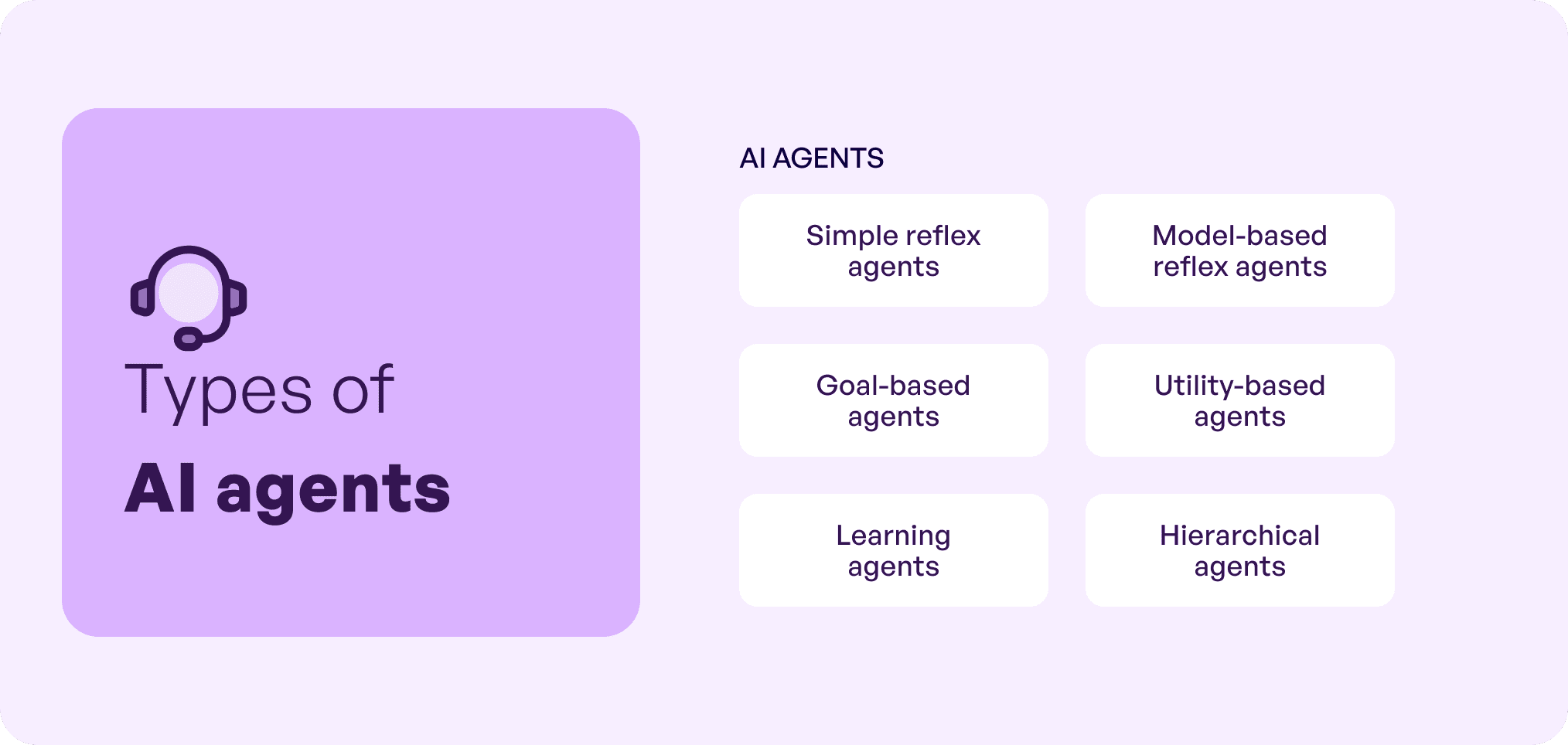
Simple reflex agents
These are basic AI agents with low adaptability, designed to work on predetermined rules or reflexes. They are ideal for easy tasks that do not require intensive analysis or a strong memory. For instance, simple reflex agents perform actions when a specific condition is met like activating cooling in a pharmaceuticals factory everyday at 10 am.
The real-life example for this can be Alexa.
Model-based reflex agents
These are competent in slightly more advanced decision-making in partially observable environments. Model-based reflex agents conduct an evaluation of the possible outcomes before making a decision. The final result, however, will depend on previous concepts and reflexes that are stored in their memories. For instance, a model-based reflex agent can turn on wall lights once its motion sensors detect footstep vibrations within half a meter.
The real-life example for this can be Amazon Bedrock.
Goal-based agents
These have powerful reasoning abilities and are able to analyze several action paths and pick the best suited one for achieving certain objectives. Their course of action typically includes lots of research and planning to arrive at the most efficient solution. For instance, a goal-based agent will choose the fastest route to the airport by taking weather, traffic, and roadblocks into account, to help you reach a destination on time.
The real-life example for this can be Google Bard.
Utility-based agents
These are equipped with robust reasoning algorithms and metrics to help users gain maximum utility out of the results. This is done in the most human way possible, that is by considering a few parameters that a human would naturally do. For instance, recommending customers a place to stay during a vacation but also ticking off factors like proximity to tourists spots, pocket-friendliness yet all necessary amenities, and extensive meals options required for all types of food habits.
The real-life example for this can be Anthropic Claude.
Learning agents
These have a continuous learning curve and perform as per prior experiences that it has gained over time. Further, every fresh task adds a new dimension and perspective to its knowledge base which helps provide solutions in unfamiliar situations. Learning agents, usually, are made from a few distinct elements such as:
- Critic: This compares the taken action with its consequence in the real world. This means it sends feedback to the learning agent on whether the performance standard has been successfully met by its responses.
- Performance: This is the process of picking the most accurate action after learning.
- Proposals: This means offering multiple options to help finalize the most worthy one that would increase the ‘satisfactory’ quotient of the end user.
For instance, Netflix learns past preferences and continuously adjusts content that would match viewers’ interests which ultimately boosts engagement and lower bounce rates.
The real-life example for this can be AutoGPT.
Hierarchical agents
These are a group of AI agents that are hierarchically arranged in terms of their ability to perform tasks. The highest one breaks down complex tasks into subtasks which are then performed by the lower level agents. In between, there are intermediary agents for coordination. For instance, robots in a warehouse are divided into different hierarchies based on optimizing production lines, handling products, and packaging.
The real-life example for this can be Google’s UniPi.
What are the top characteristics of AI agents?
AI agents work under predetermined characteristics to achieve their goals. Have a look:
Autonomy
They can perform tasks without constant human intervention and supervision. This is the core difference between AI agent and AI chatbot where chatbots need to be prompted to perfection while agents have smart algorithms that help interpret data quickly and more effectively.
Reactivity
AI agents are designed in a way that they can perceive their environment effortlessly with the help of automated planning, machine learning, and NLP.
Proactivity
Ongoing learning and adaptability help them take complete initiative and perform tasks to reach the end goal without constant human supervision. This helps employees shift their focus to high-value activities like risk assessments.
Social ability
AI agents will communicate with humans whenever necessary in case of doubts and confusions instead of giving false assumptions. This is possibly because they foresee the bigger picture and consequences of blunders.
What is the cost to build an agent?
The cost to build a custom AI agent typically ranges between $6,000 to $300,000 depending upon its complexities, functionalities, and features. So, before diving into such a project, let’s understand how it will truly benefit your industry.
Use cases of AI agents in different industries
Below are the most common cases of how businesses are using AI agents to improve their business and create a strong ecosystem for themselves. Let’s have a look.
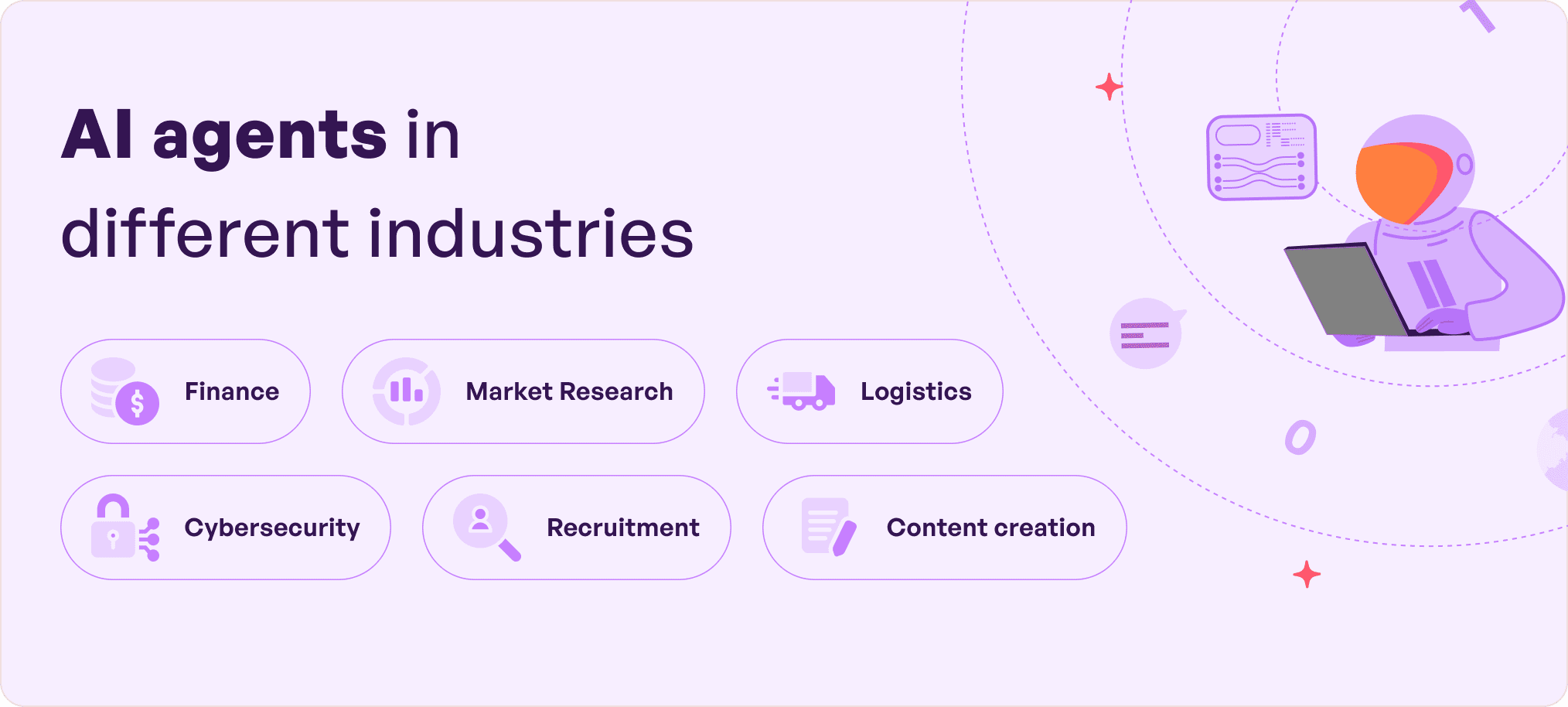
Finance
AI agents can also automate transactions, document review and journal entries which saves plenty of time and lowers the chances of fraud or human errors. They can conduct financial audits and continuous data monitoring along with creating highly informative reports. Lastly,
finance or fintech app development becomes more predictive and secure when businesses partner with companies that are experts in building AI agents.
Top finance companies using AI agents include Goldman Sachs and Bank of America.
Market research
This is the cornerstone of understanding your customers better and AI agents do it perfectly. They collect, assess, and interpret user data meticulously along with scrutinizing current and future economic trends which helps fine-tune business objectives and strategies. Further, AI agents can identify both major and minor changes in traditional markets which is helpful in modifying existing business models.
Top companies using AI agents for their market research include Ipsos and Nielsen.
Logistics
The application of AI agents in the supply chain can help you track your freight data and automate the documentation of cargo. Other important tasks include route optimization, inventory management, supplier and customer communication, scheduling production runs, and taking decisions regarding the best vendors or rerouting shipments.
Top companies using AI agents in their supply chain Amazon and Siemens.
Cybersecurity
Businesses considering cybersecurity services must know that AI agents play a vital role in minimizing the number of hacks and data breaches. This is done by real-time threat detection, tracking, and identifying the loopholes in the quickest way possible. It drastically reduces the time to eliminate vulnerabilities before they escalate. Additionally, AI agents can adapt to evolving dangers in the cyber world and detect sophisticated issues like downloading of malicious codes.
Top companies using AI agents for their cybersecurity include CrowdStrike and Microsoft.
Recruitment
AI agents can implement complex algorithms and ML techniques to perform deep analysis of candidates’ profiles and transform the hiring process. Businesses can design specific AI that can build a series of intelligent workflows to attract smart talent and stay ahead in the competitive race. The software can also be used to predict future hiring requirements which are data driven rather than based on human opinions. Overall, it has a significant impact on HR operations and can ease administrative tasks to a great extent.
Top companies using AI agents for hiring include Delta Air Lines and Unilever.
Content creation
Personalizing content as per niche market and audience are best done by AI agents. This means adding the right pinch of creativity, authoritativeness, accountability, transparency, and overall interesting facts and figures. Altogether, this helps in promoting brand awareness while identifying which marketing campaigns are resonating well with the audience.
Top companies using AI agents for content creation include Jasper and HubSpot.
Challenges and best practices of using AI agents
There are a handful of practices to follow when using AI agents since there could be language ambiguities or insufficient data training. Further, security concerns, unpredictability, hallucinations and ethical concerns like discriminatory responses are other challenges.
However, tackling these is not rocket science. Start by ensuring humans are in loop, specify the scenarios for different structures and syntax of tools usage, and explain different customer tones, languages, and attitudes in detail. This can be done with an agent-computer interface (ACI) which is a blend of art and science which can constantly tweak codes, inputs and output formats and then provide the best possible outcome.
Further, monitor AI agents for security concerns, ensure seamless integration into existing business processes, and avoid getting large and complex agents built. Altogether, these will different approaches can help minimize the risks of inefficiencies.
Conclusion
There is no industry that has not been touched by AI. There are 266 million companies across the world that have already incorporated the technology in their day-to-day work. Talking about agentic abilities, they are hands down the next wave of progress in the realm of artificial intelligence. It is no secret that down the line, AI agents will radically transform the way humans make decisions and save plenty of time, costs, and resources.
Therefore, it is a good idea to partner with a trusted AI solutions company like Simublade that will help you with creating AI agents as per your requirements along with integrating other technologies like ML and IoT to boost its overall productivity.
FAQs
Q. What are AI agents and how do they differ from traditional software?
Ans. AI agents are autonomous software programs that leverage neural networks and ML techniques to take independent decisions in businesses.
They differ from traditional software in terms of reasoning capabilities, perceptive power, and adaptability from history and experiences to curate the desired outcomes.
Q. What are the ethical considerations surrounding AI agents?
Ans. Breach of data privacy, lack of fairness and transparency, and discriminatory, biased, or offensive outputs are the top ethical concerns of AI agents.
Q. What is the future potential of AI agents in technology?
Ans. The future of AI agents looks like reshaping human-computer interactivity and driving large business revenues with powerful automation abilities.
Q. What are the challenges in developing and deploying AI agents?
Ans. Technical designs, privacy and security, model performance, compatibility, regulatory compliance, and ethics are the top challenges of developing and deploying AI agents.
Q. What are some real-world applications of AI agents?
Ans. Self-driven cars, chatbots, smoke detectors, robotics, spam detection, and optimizing traffic flows are top real-world examples of AI agents.


